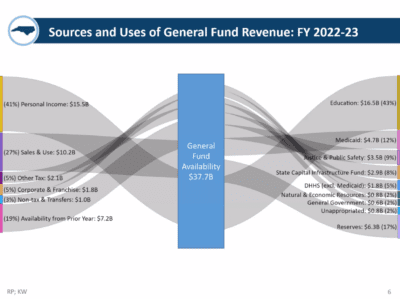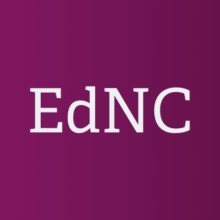
|
|
The Public School Forum of North Carolina has issued a policy brief recommending transparency and accountability measures for the state’s Opportunity Scholarship Program, which provides publicly funded vouchers for students to attend private and parochial schools.
State legislators this session have proposed to multiply spending on the voucher program by more than five times over the next 10 years. Many of the requirements that hold public schools accountable for their outcomes do not apply to non-public settings. As non-public schools receive public funds, that should change, the brief recommends.
All Republicans in the House and Senate, where they have a veto-proof majority, have signed on to support the expansion. Funding would go from $94 million in 2022 to $500 million in 2032.

The proposal, in Senate Bill 406, House Bill 823, and the Senate’s budget proposal, would widen income eligibility requirements that have been attached to the program since its creation in 2013. That means the program no longer would be only for low-income students, though some priority would be given to students who qualify for free and reduced-price lunch and students who previously received scholarships. In addition, students no longer would be required to have ever attended a public school.
The policy brief, however, focuses on what is not in the proposal. Notably absent, the brief notes, are accountability requirements to ensure that schools receiving public funds are providing quality education.
Unlike other states headed toward universal voucher programs, the brief states, “North Carolina does not require participating non-public schools to be accredited, nor to have state approval of any kind. NC also has no requirements around curriculum, teacher preparation or certification, state testing programs, or instructional hours.”
The brief outlines requirements for accreditation, teacher qualifications, and student testing that are in school choice expansion legislation in Florida, Ohio, and Iowa.

What guardrails exist in the proposal?
Participating schools must give a nationally recognized test to students in the voucher program in third grade and up. They are prohibited from using the state End-of-Grade (EOG) tests.
Schools receiving $300,000 or more annually in voucher funds are required to undergo a financial review with a CPA. In the 2018-19 school year, that meant fewer than 5% of participating schools had to complete a financial review, according to an analysis of the program by Jane Wettach of Duke University.
What else could be done?
The forum recommends that the state implement these six accountability measures so that families, parents, policymakers, and taxpayers can make informed decisions:
- Require accreditation.
This should be done by the State Board of Education or an outside accrediting agency from an approved list, the forum recommends, and “ensures that a number of baseline requirements are met, such as: tuition and fee transparency, admissions policy, and inclusion of a non-discrimination policy.” - Require the administration of state assessments and reports on results.
All participating schools should administer the appropriate assessments as determined by the State Board of Education and disaggregate the outcomes based on federal requirements. The outcomes of students receiving vouchers should be compared to students in public schools and those without vouchers in non-public settings. - Require aligned curricula.
Schools in the program should be required to use a curriculum that is aligned with the North Carolina Standard Course of Study and have the same requirements on instructional time as public schools. - Establish employee requirements.
Federal background checks should be required of all employees in participating schools, and administrators and teachers should have baseline education requirements. - Require enrollment reporting.
Schools in the program should be required to report on enrollment just as public schools do, including mid-year changes, the forum recommends, so that funds can follow students accurately. - Require the same financial reporting as public schools.
What’s next?
The legislature has not yet released or passed a final budget. Click the following links for EdNC’s coverage of voucher expansion and the legislative session so far.
If the scholarship expansion is in the final budget, it “would significantly impact the education landscape in North Carolina,” the forum’s brief states.
An analysis by the Office of State Budget and Management found the expansion could cause public schools to lose anywhere from $101.9 million to $305.7 million, with particularly big cuts (as big as 8%) for public schools in low-wealth and rural counties.
Recommended reading




